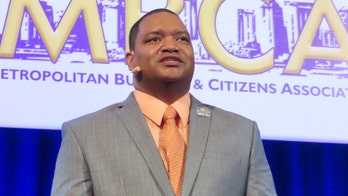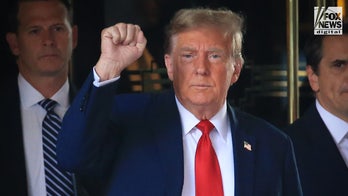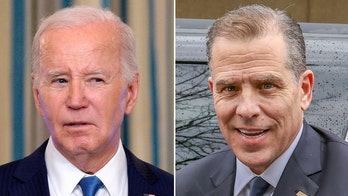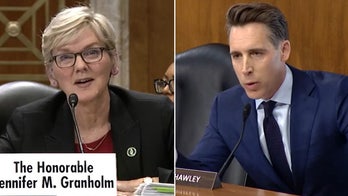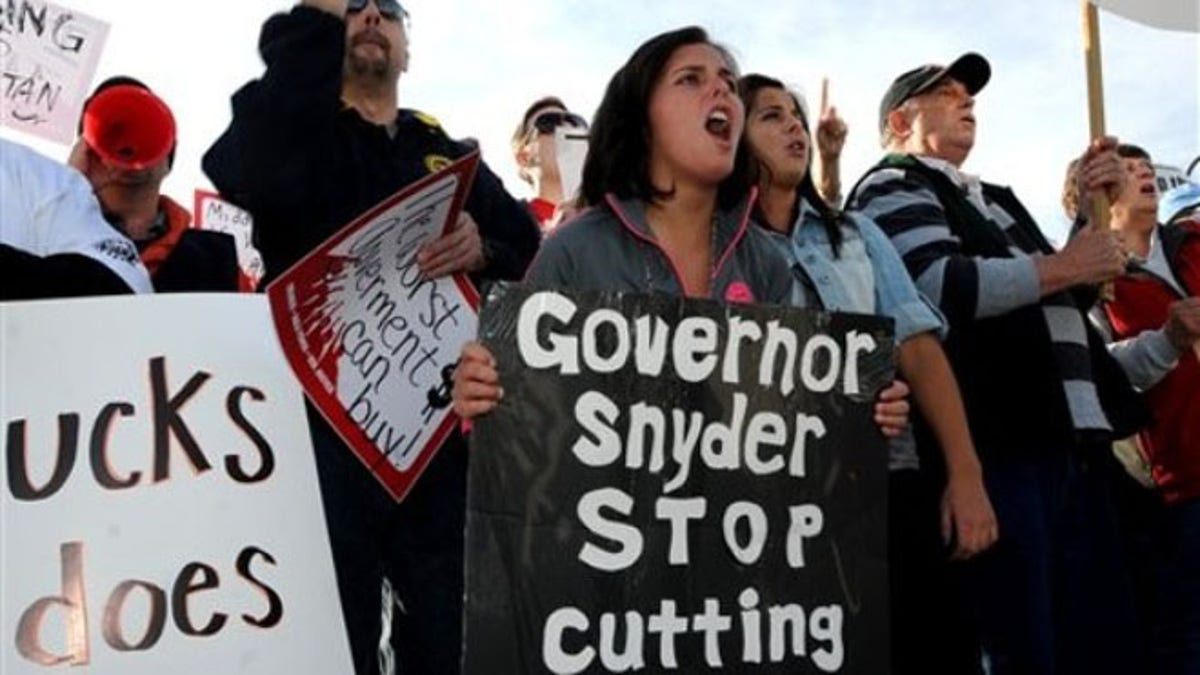
FILE: April 17, 2012: Protesters demonstrate against Michigan Gov. Rick Snyder and Wisconsin Gov. Scott Walker outside the annual Reagan Dinner in Troy, Mich. (AP)
On the heels of the epic clash over collective bargaining in Wisconsin, labor groups in neighboring Michigan are launching an aggressive bid to erect a force-field around union benefits by enshrining their bargaining "rights" in the state constitution.
The union-backed campaign has business leaders and Republican lawmakers gearing up for an election fight. Unions are pushing to get their initiative on the November ballot and have submitted more than enough signatures to qualify.
The seemingly straightforward measure would call for a constitutional amendment creating a right to collective bargaining. But critics warn it could short-circuit and roll back, respectively, dozens of legislative proposals and existing laws -- as well as prevent the state from ever passing a "right-to-work" law barring unions from demanding dues from employees.
Michigan House Speaker Jase Bolger described the push as an "overreach" that would unravel the legislature's work.
"It would undo the reforms we've adopted in the past year and a half," Bolger told FoxNews.com.
Republicans took control of the Michigan capital in the 2010 elections and have since passed several union-curbing bills. They include measures that require public union workers to pay at least 20 percent of health care costs, that ban unions from automatically deducting dues from school employees and that require workers to pay more into the state retirement system.
Republicans say the collective-bargaining amendment could threaten any of those measures and more, which Bolger warned would upend the state's finances just as they were getting back on track.
"It will send Michigan on the direction of Illinois and California, without any doubt," he said.
Supporters, though, cast the ballot measure as a response to an overreach by lawmakers in Lansing that stripped union workers of their benefits and impeded the bargaining process.
"There's been under-the-radar, but obviously very deliberate, attempts to chip away at collective bargaining and fair wages and the ability to negotiate for working people and working families over the last 18 months," said Dan Lijana, spokesman for the Protect Our Jobs coalition. "Those attacks on workers and working families motivated a huge grassroots outpouring of interest in protecting collective bargaining."
Some have questioned GOP claims that their proposal could nullify dozens of laws. Lijana acknowledged the amendment could affect other laws on the books, but said the campaign is not about other laws and not about right-to-work legislation. "This campaign is about collective bargaining," he said.
Supporters in June filed 684,000 petition signatures with the state, more than twice the number needed to qualify for the ballot. State officials still have to give the signatures and the question the green light.
The "Protect Our Jobs" question is one of a dizzying array of proposed ballot measures in Michigan this year. Among the measures is a proposed amendment requiring utilities to get at least a quarter of their electricity from renewable energy sources and a proposed amendment to recognize "the right of the people to alter or abolish" the government. The list of proposals also includes proposed amendments to further curtail union rights and benefits.
The line-up has Michigan looking more like ballot-initiative-happy California. The overload has already engendered a backlash in the state, with a coalition formed last month decrying the "unprecedented assault" on the state's constitution.
Among that group is the Michigan Chamber of Commerce, which has singled out the "Protect Our Jobs" initiative as tantamount to "war on our state's economic competitiveness."
Foes of the proposal take solace in the outcome of the protracted Wisconsin fight, where Republican Gov. Scott Walker ultimately survived his recall battle.
But Bolger warned that the unions are prepared to "invest significant resources" in this fall's campaign to pass their ballot question, presuming it's certified.
"As long as taxpayers are well-informed, I'm confident that taxpayers will make the right decision," he said.

